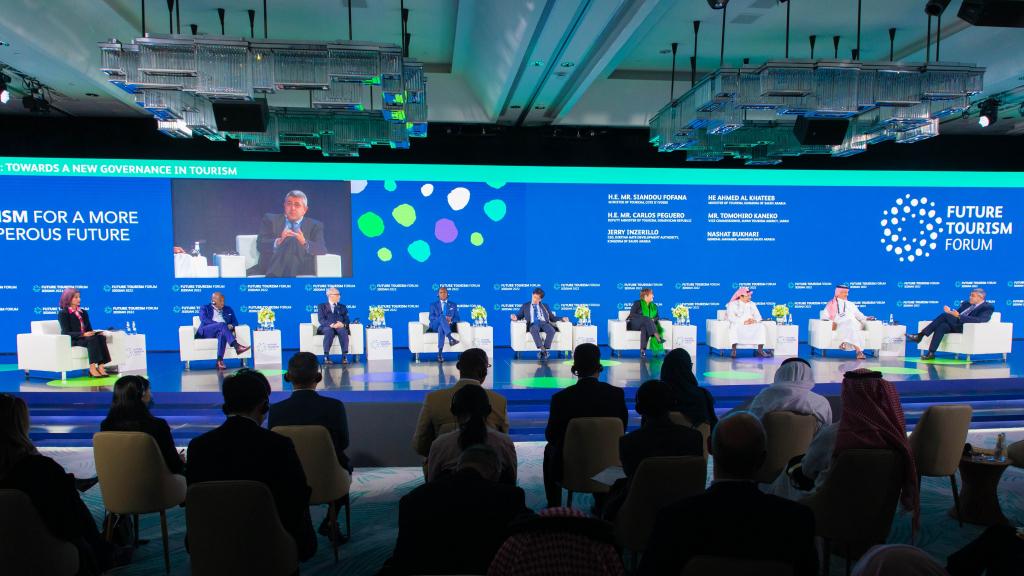At the 116th session of its Executive Council, the United Nations specialized agency called for the construction of a new and renewed governance and financing system to deal with future impacts
In Jeddah, UNWTO continued its tradition of complementing the important deliberations of its Executive Council with an open debate on the biggest challenges and opportunities for the sector. The Forum “Futures of Tourism – New Governance and Promotion”, had two different sessions: “Towards a New Governance of Tourism” and “Increasing the Visibility of Tourism” outside the sector.
“Now is the time to think big,” said the UNWTO Secretary-General as he welcomed delegates and speakers. Zurab Pololikashvili emphasized the need to “realize tourism’s unique potential to drive recovery, provide opportunity and build resilience, through better and stronger governance and a focus on jobs, training and education.”
His Excellency Ahmed Al Khateeb, Minister of Tourism of the Kingdom of Saudi Arabia, commented: “We cannot recover backwards. Now is the time to capitalize on this increased recognition and position tourism as an essential pillar of transformation, development and opportunity.” The Minister also reiterated the Kingdom’s plans to invest US$100 million in training 100,000 young tourism workers.
Diverse voices around a common goal
Illustrating the diversity of UNWTO Members, the High-Level Thematic Debate featured contributions from Ahmed bin Aqil Al Khateeb, Minister of Tourism of Saudi Arabia, Siandou Fofana, Minister of Tourism and Recreation of Côte d’Ivoire, Carlos Peguero , Vice Minister of Tourism of the Dominican Republic, Tomohiro Kaneko, Vice Commissioner of the Japan Tourism Agency, Najib Balala, Minister of Tourism of Kenya, Sofia Zacharaki, Vice Minister of Tourism of Greece, and Tonči Glavina, Secretary of State of the Ministry of Tourism and Croatian Sport.
Similarly, highlighting the breadth of the sector and the extent of UNWTO’s influence, ministers were joined by high-level representatives from business, destinations, media and communications, including from Euronews, PRM Global, Interbrand, Netcom, Amadeus and Diriyah Gate Development Authority (DGGA). Referring to the shared desire to get tourism moving again, Jerry Inzerillo, executive director of the DGDA, noted: “We may not share the same ideology, we may not share the same theology, but we share the same biology,” noting a universal desire to travel and connect with other cultures.
Providing the media perspective, Ruth Wright, head of tourism and lifestyle verticals at Euronews, emphasized that viewers still demand certainty as “the perception among travelers is definitely that traveling is difficult and stressful.” As a result, rules and regulations-focused content remains relevant, even as human-led tourism stories become more popular. “Travellers long to return to the day when travel was fun, carefree and full of unexpected surprises,” she added.
From Jeddah to the world
With the discussions emphasizing the importance of taking a whole-of-government approach to tourism policy, with the ministries of finance and interior also part of the governance of the sector, Secretary-General Pololikashvili urged the participants and all members of the Executive Council UNWTO to advance this important agenda for positive change.
The Jeddah Call to Action recognizes the vital need for more and better tourism governance, with targeted investments and a focus on building resilience, advancing sustainability, and expanding education and training. It forms part of UNWTO’s broader work to ensure that the recognition of tourism reflects the unique social and economic importance of the sector, including by making it a key part of the work of the United Nations and by ensuring the cooperation of governments, international organizations and financial institutions.


